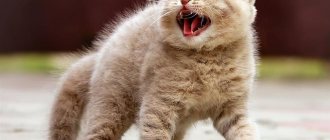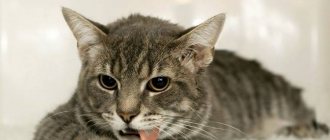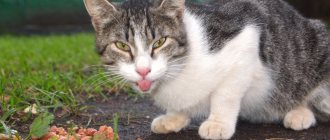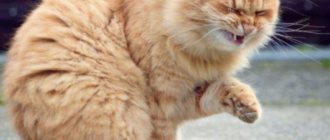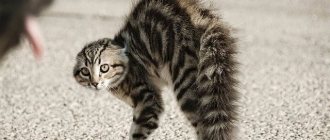A caring owner is concerned about why the cat has become lethargic and sleeps all the time. This condition occurs in kittens and adult cats. There can be many reasons. To find out what it is connected with, you need to contact a veterinarian and conduct a series of diagnostic tests. If you do nothing, serious complications are possible, including death.
Why is the cat acting lethargic?
This state means complete indifference to the environment, weakness, drowsiness, the animal lies all the time, does not react to the outside world, perhaps even refuses to eat. Lethargy in cats occurs for the following reasons:
- middle age;
- taking medications;
- decrease in hemoglobin in the blood;
- heart and vascular diseases;
- inflammatory processes, infections;
- injuries;
- tumors;
- neurological diseases;
- disruption of hormone levels and endocrine system;
- helminths;
- piroplasmosis;
- being in a stuffy room.
The origin of the cat's long sleep
Cats are originally nocturnal animals. This is how their distant ancestors were, and this is how modern mustachios-striped animals remain. This quality is especially familiar to residents of rural areas, private houses and summer cottages. Living in complete or partial freedom, cats come home only to eat and sleep, preferring to travel or hunt at night.
Domestic cats, who live indoors all their lives, rarely roam around the apartment at night, so they sleep much more than their more free-spirited counterparts. For them, significant daytime sleep is simply necessary, as the body needs to recover and digest the prey. How domestic fluffies sleep so much and maintain the flexibility of the spine and joints, the elasticity of muscles with little physical activity is a mystery that has not yet been solved by scientists.
Diseases accompanied by lethargy
Anemia and apathy
A pet's lethargic state can be caused by a low level of hemoglobin, which is caused by poor nutrition.
The cat has become less active, has stopped enjoying life normally, is not eating well, the mucous membranes have become pale - one of the reasons may be anemia. This means that there is a decrease in the number of red blood cells and hemoglobin in the pet’s blood. Factors that contribute to anemia can be both poor diet and various diseases.
Stomach diseases
If the cat does not eat well and sleeps constantly, he experiences periodic vomiting, diarrhea, he has become passive, it is necessary to check the organs of the gastrointestinal tract. The cat becomes weak. Perhaps she will eat inedible objects. When nauseated, swallows fur or balls of hair to induce vomiting.
Diseases of the cardiovascular system
The reasons are completely different. Most often develop after an infectious disease. The cat becomes apathetic, lethargic, eats poorly, plays little, blood pressure is low, and breathing is rapid. The mucous membranes become bluish in color. Swelling appears. There may be an increase in body temperature, the cat is hot to the touch and sad. In severe cases, the weight sharply decreases or increases. The animal trembles, drinks a lot, breathes heavily with its mouth open, hides from people, and does not get up.
Infections and inflammation
Infectious inflammations are accompanied by symptoms such as coughing or vomiting.
Diseases of an infectious and inflammatory nature are manifested by changes in the cat’s behavior. He eats nothing all day, lies inactive, and hardly plays. This passive state is accompanied by other signs. In case of kidney ailments - swelling of the cat's face, paws, rapid breathing, she often goes to the toilet, vomiting and weight loss are possible. Rhinotracheitis occurs similarly to a respiratory infection in humans. Accompanied by nasal congestion, cough, watery eyes, the cat is hot, the mucous membranes of the nose and throat are swollen. The nose is dry and cold.
Piroplasmosis
The carrier is ticks infected with Babesia. Most often they bite unvaccinated cats during the peak of activity, that is, in spring and autumn. Pets develop weakness and become apathetic. The cat eats little and sleeps a lot. A complete refusal of food is possible. A high temperature and pallor of the mucous membranes appear. The urine becomes dark or red. If treatment is not started at an early stage, the animal will die.
Tumor processes
In cats, like in people, education does not make itself felt for a long time. You need to pay attention to your pet’s health in order to recognize it in time. The cat has become lethargic, sad, apathetic, lies constantly, and rarely plays. Usually body weight falls, diarrhea and vomiting occur. With a brain tumor, neurological disorders appear (lethargy, hallucinations, seizures). Sometimes lethargy sets in.
Differences between a tired cat and a lethargic cat
It can be difficult to determine whether a cat is truly lethargic and sick or is simply tired and needs extra sleep.
- Behavior of a tired cat
A tired cat will sleep longer, but when awakened, will play, run, explore, and behave normally while continuing to eat and drink. Tired cats are only tired for a short time. Once they've had a good night's sleep after an exciting day, they're ready to return to their normal day as a curious, active cat.
- Lethargic cat behavior
A lethargic cat will have a long period of weakness, depression, or lack of energy. Even after a nice long nap or relaxing sunbathing, these cats will remain tired and not as active as usual. Cats with lethargy are sick, and there are usually other signs that something is wrong.
Many lethargic cats hide in a quiet, dark place, such as under a bed or in a closet. They tend to prefer areas away from people and other pets.
Other reasons
Helminthiasis
If parasites enter a cat's body, it may experience health problems such as diarrhea or hair loss.
The disease is caused by parasites - worms. They can be present in grass, food, soil, water. Once in the animal's body, they use it for survival. The cat has health problems. Symptoms depend on the degree of worm infestation. The cat does not eat, vomiting, diarrhea, cough, hair loss, rashes appear, the pet scratches its butt near the anus. The tummy gets bigger. Symptoms of intoxication appear.
Age of the cat
An old cat becomes lethargic, sleeps a lot, plays little, appetite, hearing, vision and smell are impaired. The fur becomes dull. As an animal ages, its behavior changes. Or the pet becomes more affectionate, climbs into your arms, caresses. Or, on the contrary, he shows nervousness and aggression. The immunity of cats decreases, which is why they are susceptible to infections.
Vaccinations for babies
Vaccination protects animals well from various diseases. However, complications may occur. Both allergies and individual reactions. After vaccination, the kitten eats poorly, is lethargic, drowsy, refuses to eat, and the temperature rises. The nose becomes hot or cold. If these symptoms last more than 3 days or are too severe. you need to contact your veterinarian.
What is lethargy or lethargy?
Lethargy is the absence or lack of energy or enthusiasm. Lethargic cats appear depressed, tired or lethargic, sleep more than usual, and do not play as much as usual. They may also appear weak and less active than usual. Lethargic cats may be reluctant to get up to use the litter box and may become ill in other ways.
Some lethargic cats also have a fever, an upset stomach with vomiting or diarrhea, or are uninterested in food, water, or favorite treats. If lethargy continues for a period of time, they may show signs of weight loss or muscle atrophy.
© shutterstock
Diagnostics
At the appointment, the veterinarian collects an anamnesis from the owner, what the animal did and ate, and then carries out diagnostic procedures.
There are methods that will allow you to make a correct diagnosis and find out why your beloved animals are sick:
- It is necessary to find out what the owner associates the disease with. What did the cat eat, where was it, did it walk outside, what medications did it take. That is, collect anamnesis.
- The doctor takes tests - general blood and urine, biochemistry, feces for coprogram and worm eggs.
- Depending on the symptoms, additional examinations are prescribed - ultrasound, x-rays, surgical diagnostic intervention.
Normal sleep duration for an animal
Like human offspring, kittens sleep almost all the time, interrupting only to feed. This is completely normal, because their body is still very weak. In their sleep they grow and become stronger. A slightly older cub sleeps less, but still at least half a day.
An adult cat sleeps about the same amount or a little less/more. It is impossible to give an exact figure, because all animals have a pronounced individuality. Much depends on the character. Some cats are energetic, active, they play a lot and have fun. Others are inert, lethargic, prone to weight gain and much less active than their vigorous counterparts. Most of the time they just sleep.
There is a popular expression: “sleeps like a cat with half an eye.” This is a very apt remark. Unlike humans, who must sleep at least 7-8 hours in a row to restore energy, cats sleep in “short intervals.” On average, they simply doze for most of the time without losing their alertness. As soon as the slightest rustle is heard, the cats immediately wake up.
All sleep in cats is divided into two phases:
- Nap, superficial “slow” sleep – 20-30 minutes.
- Deep, “fast” sleep – 5-7 minutes. At this time, animals, like people, dream. Cat owners are well aware of this, since a sleeping pet can twitch its paws in its sleep, “run” and even meow. All this clearly indicates the presence of dreams.
The duration of sleep can be influenced by various external factors, for example, extreme fatigue, stress, changes in temperature. Physiology also influences the duration of rest. Pregnant cats sleep much more - this is a need for the body experiencing increased stress.
How to treat a pet?
To cure a disease, the cause must be eliminated.
If it is caused by taking medications, stop taking it. For helminthiases, the cat is given a drug that removes them. They go to the toilet and the worms will come out along with the feces. Piroplasmosis is treated with special substances that kill Babesia. In case of inflammation and infections, you need to relieve this process with anti-inflammatory or antibiotics. Maintenance therapy and pills to boost immunity are used. Only a doctor can identify the cause and prescribe the correct treatment.
Why do kittens sleep for a long time?
Any cat owner will confirm that these animals are real sleepyheads, capable of dozing for hours in their favorite place, regardless of the time of day.
On average, these pets sleep 17-19 hours.
And such sleep is beneficial for their body:
- promotes the digestion of protein foods;
- ensures good health;
- maintains the supply of energy necessary for the period of wakefulness.
Babies' sleep. Young kittens also need a lot of sleep, and until 8 weeks of age they sleep almost all the time, waking up only to eat. This period is associated with:
- active growth of the animal;
- strengthening the immune system;
- formation of the nervous system.
By 4-5 months, some of the kittens reach the size of an adult cat. Veterinarians do not recommend preventing a purring pet from sleeping by waking it up or shaking it. These actions can lead to the development of diseases and even death of the pet. If there are no signs of pathology, then you should not disrupt the kitten’s routine.
8-10 weeks after birth, your little pet will get stronger and stay awake longer.
How to make a cat happy
There are several ways to make your sad cat happy.
These include:
Make time for games. Depressed cats will get rid of their aggression if you play with them.
Pet the cat. Cats love to communicate with their owners (although in the case of cats, you still need to think about who the owners are - cats or people). Your gentle, stroking hand can stabilize an anxious cat without restricting its movement.
Using catnip. Catnip is a plant in the mint family that contains the natural oil nepetalactone, which has unique effects on cats. When cats rub or chew catnip, it produces a mild, natural high that is both safe and temporary, but enjoyable for cats.
Specialist consultations. A certified animal behaviorist may be your best choice to cheer up your pet, as they have the knowledge and experience to treat depressed pets.
When to call the vet. If you notice that your cat is showing signs of chronic depression, stress or illness, you should contact your veterinarian. Your veterinarian may recommend medical intervention or simply change your daily routine.
Signs of a sick cat include:
- Loss of appetite
- Changing your sleep pattern
- Crying or searching
- Need for extra attention
- Overall sad behavior
Step three - transport the animal to the clinic or wait for the veterinarian to arrive
The third step is to properly transport the pet to a veterinary hospital. In big cities it is possible to call a specialist to your home. In this case, after the doctor is called to your home, you need to follow all the advice before his arrival. If the animal is in a condition that requires transportation, it is necessary to properly create conditions for its transportation.
The basic rules of transportation are:
- preparation of a special container;
- It is not recommended to feed the animal before the trip;
- Prepare water for drinking, a disposable moisture-absorbing diaper, wet wipes (in case the animal vomits), a warm blanket or rug.
It is very important to purchase a special container for transportation. This could be a carrying bag or a plastic box. The convenience lies in the fact that such a carrier can be positioned across the movement and be well secured when the car is moving.
Some cats do not do well when being transported in a plastic container. In this case, the fixation should be using a harness that is tied to the back seat of the car. For convenience, you can use a special case or purchase a hammock for transportation.
